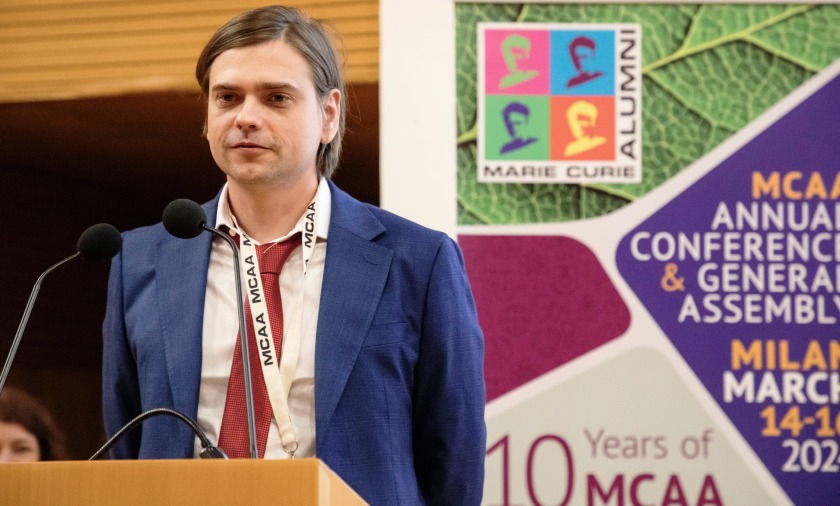Best Innovator Award 2023 for Artem Musiienko

Dr. Artem Musiienko received the MCAA Best Innovator Award for his invention of the CLIMAT-Method of characterising semiconductors at the Marie Curie Alumni Association (MCAA) in Milano, Italy, March 2024.
© MCAA
Dr. Artem Musiienko has been awarded a special prize for his groundbreaking new method for characterising semiconductors. At the recent annual conference of the Marie Curie Alumni Association (MCAA) in Milan, Italy, he received the MCAA Award for the best innovation. Since 2023, Musiienko has been carrying out his research project with a postdoctoral fellowship from the Marie Sklodowska Curie Actions in Antonio Abate's department, Novel Materials and Interfaces for Photovoltaic Solar Cells (SE-AMIP).
Musiienko has developed a new method to comprehensively characterise semiconductors using a single measurement process: The "Constant Light-Induced Magneto-Transport (CLIMAT)" is based on the Hall effect and allows to record 14 different parameters of transport properties of negative and positive charge carriers. The European Patent office has already approved the method's patent (EP23173681), and Artem is currently negotiating with a company to license the technique.
“The CLIMAT method is a disruptive and innovative technique that has the potential to become the gold standard in material characterization”, emphasizes Prof. Antonio Abate. The MCAA Best Innovator Award amounts to 1.500 euros and an award statuette.
arö
https://www.helmholtz-berlin.de/pubbin/news_seite?nid=26446;sprache=en
- Copy link
-
Lithium-sulphur pouch cells investigated at BESSY II
A team from HZB and the Fraunhofer Institute for Material and Beam Technology (IWS) in Dresden has gained new insights into lithium-sulphur pouch cells at the BAMline of BESSY II. Supplemented by analyses in the HZB imaging laboratory and further measurements, a new picture emerges of processes that limit the performance and lifespan of this industrially relevant battery type. The study has been published in the prestigious journal Advanced Energy Materials.
-
Ernst Eckhard Koch Prize and Synchrotron Radiation Innovation Award
This year, the Friends of Helmholtz-Zentrum Berlin (Freundeskreis des HZB e. V.) awarded the Ernst Eckhard Koch Prize to Dr. Dieter Skroblin of the Technische Universität Berlin for his outstanding doctoral thesis. The European Innovation Award Synchrotron Radiation went to Dr. Manfred Faubel from the Max Planck Institute for Dynamics and Self-Organization in Göttingen and Dr. Bernd Winter from the Fritz Haber Institute in Berlin. The award ceremony took place at this year's HZB user meeting.
-
Two Humboldt-Fellows join HZB
In 2024, two young scientists joined HZB as Humboldt Fellows. Kazuki Morita joined Prof. Antonio Abate's group and brings his expertise in modelling and data analysis to solar energy research. Qingping Wu is an expert in battery research and works with Prof. Yan Lu on high energy density lithium metal batteries.
